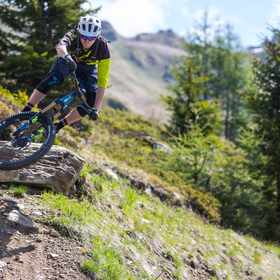I’ll get straight to the point: the main thing you need to know about the X-Fusion Trace 36 HLR fork is that the spring won’t suit everyone.
That’s because while the positive spring (the part that holds up your weight) is air sprung and therefore adjustable, the negative spring (the one that counteracts the positive at the beginning of the travel to soften the beginning-stroke) is a one-size-fits-all coil spring.
- How much suspension travel do I need on my mountain bike?
- How to set up your mountain bike suspension
So if you’re a heavier rider, and therefore put more pressure in the positive spring, the coil negative doesn’t account for this, resulting in the fork being very firm at the start of the travel.
Conversely, if you’re a lighter rider using much less air pressure, the coil negative may overwhelm the positive spring, causing it to sink down into its travel even without any weight on the bike.
- This fork was tested as part of a group test including ten of the best enduro forks. All forks were tested back-to-back on the same tracks, keeping all other variables as consistent as possible to ensure our findings are as reliable and accurate as they can be.
X-Fusion Trace 36 HLR fork setup
X-Fusion recommends 90psi for my weight: 86kg. This was far too firm and gave me almost no sag.
Once I’d dropped the pressure to 65psi, I measured 14 percent sag (I’d usually aim for 20 percent) yet the fork still felt too soft deeper into the travel.
The spring setup was always a compromise between a beginning-stroke that was too firm and a mid-end stroke that was too soft.
X-Fusion Trace 36 HLR fork performance
Because of the small amount of sag, the fork sat too high when climbing or when riding through flatter tracks, where it lacks traction and predictability.
But when faced with braking or berms, it pushed through the remainder of its travel too easily, creating a trap-door feeling.
However, when ploughing through large holes and rocks, the Trace swallows them up with minimal fuss. This is partly due to that soft spring-rate in the middle of the travel, but the chassis was unfazed by square-edged hits and the damping is promising too.
Adding a few clicks of high-speed compression held the fork up noticeably through big successive hits, without robbing too much of that suppleness. But this was only a sticking plaster for the unsupportive spring.

Lighter riders who run softer spring pressures might find the Trace works well for them, but I was so far away from the ideal window that it’s hard to say what air pressure or rider weight it will work for.
Most other forks have self-equalising springs or adjustable negative springs, so the spring can be adjusted to suit all riders well.
I asked Upgrade bikes, X-Fusion’s UK distributor, if it would offer different negative springs for different rider weights. Upgrade told me that X-Fusion doesn’t currently manufacture them. However, it says the issue has been raised with X-Fusion, and suggested the Trace can be “modified” internally to improve the feel somewhat for heavier riders (presumably by preloading the negative spring).
This is not something I’ve attempted, and until X-Fusion offers an alternative to the single negative spring option, I can’t recommend the Trace above the competition.
How does it compare to its main rivals?
Over long descents, the Trace was comfier than the MRP Ribbon air and Öhlins RXF 36 EVO. But if the spring doesn’t happen to work for your weight, it can’t compete with the other forks on test when it comes to grip, support and predictability.
This video shows how we tested the forks and how they compare.
Product
| Brand | Xfusion |
| Price | £800.00 |
Features
| Spring type | air |
| Wheel size | 29in_700c |
| Travel | 160.0000 |
| Travel | MILLIMETER |
| Features | Travel Options: 29in - 170mm(stock) adjustable internally to 140 or 160mm Crown to axel length: 571mm |
